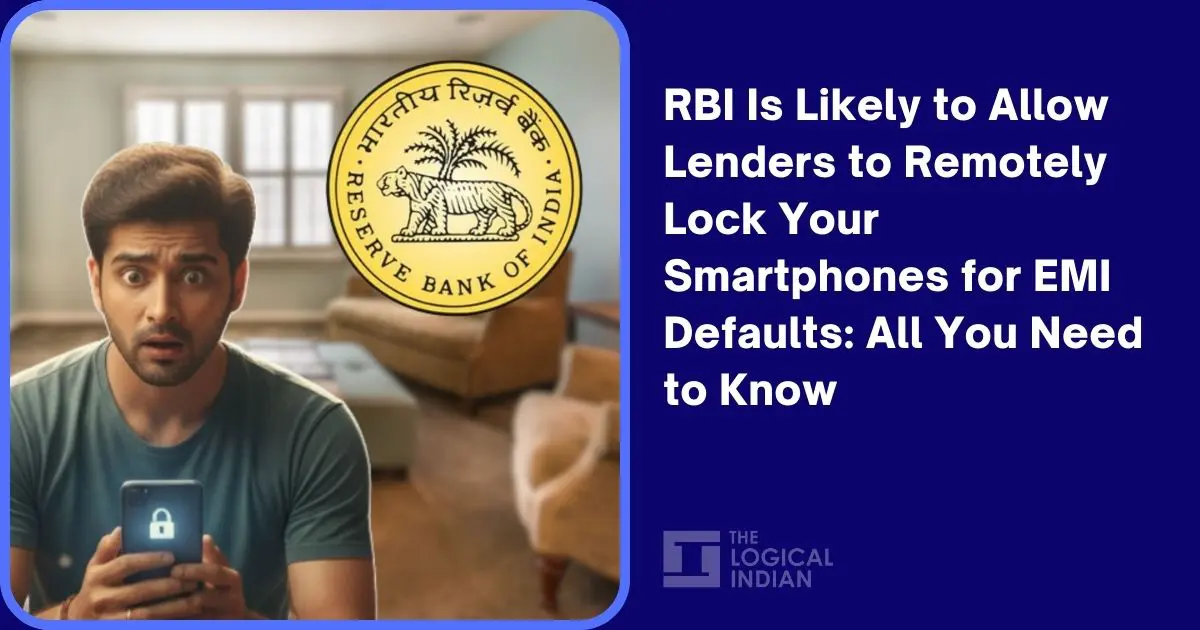New Delhi: The Reserve Bank of India (RBI) is moving towards allowing lenders to remotely lock smartphones bought on EMI in cases of payment defaults, a measure aimed at tackling increasing consumer loan defaults. While the initiative may help financial institutions recover debts, it has sparked debates on privacy and digital access, especially for vulnerable borrowers. Plans include stringent borrower consent and prohibitions on accessing personal data during the process.
RBI Tightens Smartphone Loan Recovery
In a significant regulatory shift, the Reserve Bank of India (RBI) is finalizing guidelines that would enable banks and non-bank finance companies to remotely lock devices purchased on Equated Monthly Installments (EMIs) if borrowers fail to adhere to payment schedules. This decision emerges amid growing concerns over escalating loan defaults among small-ticket borrowers, with recent estimates suggesting that more than one-third of mobile phones in India are bought using credit.
The RBI has stated that “remote locking will only be used as a last resort, with strict privacy controls in place. Lenders will not be allowed to view or manipulate any personal data on borrowers’ devices.” The proposed approach primarily targets loans below ₹1 lakh, where default rates have reached troubling levels. Before taking out a loan, consumers will be informed about this remote locking mechanism and will need to provide consent before it can be activated, ensuring a degree of transparency.
To facilitate this, lenders will use specialized software that allows them to lock the device without accessing personal information, addressing apprehensions from earlier privacy violations. Given that millions in India rely on their smartphones for work, education, and government service access, implementing this policy will demand precise execution and clear communication from lenders.
The Policy’s Background and Evolving Debate
This move follows an earlier RBI directive that placed a moratorium on the practice of app-based device locking, prompted by consumer outcries over privacy risks and access issues. Many borrowers reported that remote locking impeded their ability to access emergency services and exacerbated challenges already faced during financial hardship.
Companies focused on providing affordable loans for gadgets have advocated for remote locking, claiming it is essential for curbing defaults. The RBI’s draft ‘Fair Practices Code’ aims to strike a balance between the needs of lenders and the rights of borrowers. However, technology experts warn that remote locking could inadvertently deepen digital exclusion for already vulnerable populations.
Industry insiders stress that without enforceable mechanisms for digital recovery, financial institutions may face elevated risks, potentially resulting in higher interest rates and reduced access to credit for underserved communities. In contrast, civil society organizations argue that any form of remote locking should prioritize respect, transparency, and access to crucial communication services.
Stakeholder Reactions: Voices from the Field
Reactions to the RBI’s proposal have been mixed. Officials from leading banks view the move as a necessary measure to introduce needed discipline into the loan market. However, privacy advocates, such as Srikanth L., the founder of CashlessConsumer, warn about the potential “punitive digital ecosystem that may disproportionately affect the poor and digitally marginalized.”
Stories shared by consumers online underline how EMI-linked phone locks could disrupt livelihoods and hinder critical communications in times of need. On the flip side, technology firms developing secure remote-locking systems assert that advancements in encryption will prevent instances of misuse, ensuring that only the intended borrower’s device is affected.
Interestingly, some users, particularly those with stable financial situations, support the policy due to its supposed deterrence effects. Meanwhile, digital rights activists advocate for a more comprehensive approach that includes debt relief and credit counseling alongside such enforcement measures.
The Logical Indian’s Perspective
The Logical Indian emphasizes a vision of growth that encompasses empathy, meaningful dialogue, and responsible innovation. In an increasingly digital world, a mobile phone is no longer just a gadget; it is a lifeline to essential services and life opportunities. While lenders require effective recovery tools, it remains crucial that regulations protect user rights at all stages. Balancing the operational needs of financial institutions with the rights of consumers will be key to fostering a sustainable and equitable financial ecosystem.
| Aspect | Details |
|---|---|
| Targeted Loans | Loans below ₹1 lakh |
| Consumer Impact | One-third of mobile phones purchased on EMI |
| Privacy Measures | Borrower consent required, no access to personal data |
| Stakeholder Opinions | Bank officials support; privacy advocates caution |
Bankerpedia’s Insight 💡
The RBI’s initiative to allow remote locking of smartphones purchased on EMI has critical implications for India’s banking sector. As defaults surge, this move aims to bolster recovery efforts while raising significant privacy and ethical concerns. With technology increasingly embedded in daily life, the balance between lender rights and consumer protection becomes crucial. Readers should remain informed about their loan agreements and understand their rights, particularly regarding privacy and data protection, as these regulations evolve. A transparent approach is essential to ensure that digital tools assist rather than alienate vulnerable borrowers.
What Does This Mean for Me? 🤔
- Salaried Person → Increased risk of phone lock due to loan defaults.
- Business Owner → Increased financial risk and potential customer trust issues.
- Student → Risk of losing access to phone affects studies and communication.
- Self-employed → Increased risk of phone lock due to payment defaults.
- Homemaker → Increased risk of losing essential communication during defaults.
- Retiree / Senior Citizen → Increased risk of losing smartphone access for payments.
- Job Seeker → Increased risk of losing access to essential devices.
- Farmer / Rural Citizen → Increased risk of losing vital communication tools.
Research References 📚
- thelogicalindian.com
- RBI
- SEBI
- Ministry of Finance
- NABARD
- Department of Financial Services (DFS)
- IMF
- World Bank
Loved our Research? ❤️
Bankerpedia turns financial confusion into clarity!
Subscribe to our YouTube channel for unbiased insights, financial literacy & practical banking wisdom.










